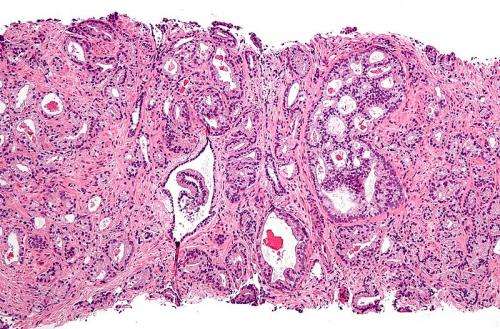Comparing chemical and surgical castration for prostate cancer

Surgical castration to remove the testicles (orchiectomy) of men with metastatic prostate cancer was associated with lower risks for adverse effects compared with men who underwent medical castration with gonadotropin-releasing hormone agonist (GnRHa) therapy, according to an article published online by JAMA Oncology.
Androgen-deprivation therapy (ADT), which is achieved through surgical or medical castration, has been a cornerstone in the management of metastatic prostate cancer (PCa) for the past 50 years. But the use of bilateral orchiectomy has been nearly eliminated in the U.S. because of cosmetic and psychological concerns.
Quoc-Dien Trinh, M.D., of Brigham and Women's Hospital and Dana-Farber Cancer Institute, Boston, and coauthors compared adverse effects of GnRHa and bilateral orchiectomy in 3,295 men with metastatic PCa (66 or older) between 1995 and 2009. The authors analyzed six major adverse effects, which were picked based on their effect on a patient's quality of life, the potential for increased health care costs, and on a previously described association with ADT use. The six adverse effects were: any fractures, peripheral artery disease, venous thromboembolism, cardiac-related complications, diabetes and cognitive disorders.
Of the 3,295 men, 87 percent (n=2,866) were treated with GnRHa and 13 percent (n=429) were treated with orchiectomy. The overall three-year survival was 46 percent for GnRHa treatment and 39 percent for orchiectomy.
The study indicates surgical castration through orchiectomy was associated with lower risks of any fractures, peripheral artery disease and cardiac-related complications compared with medical castration with GnRHa. No statistically significant difference was found between orchiectomy and GnRHa for diabetes and cognitive disorders.
Men treated with GnRHa for 35 months or more were at the greatest risk of experiencing any fracture, peripheral artery disease, venous thromboembolism, cardiac-related complications and diabetes, according to the results.
The authors note limitations to the study, primarily its retrospective design which relies on historical data.
"In some patients who need permanent androgen suppression, surgical castration may represent a suitable alternative to GnRHa. However, other considerations must be contemplated when deciding between medical or surgical castration (i.e., young age, intermittent ADT)," the study concludes.
"Despite their retrospective nature, studies such as this are critically important, because they increase awareness of these concerns. Because men with metastatic PCa [prostate cancer] are living longer than ever, it is imperative that we minimize the risk of harm from therapies. Physicians treating patients with PCa must familiarize themselves with how to prevent and treat these complications ... The current article by Sun et al adds fuel to an already controversial debate and the discredit brought by the reimbursement issues. When there is more than one reasonable option, clinical decisions must be guided by the patient's values and preferences. In the absence of clear evidence to the contrary, patients are likely to continue to overwhelmingly favor GnRHa over orchiectomy," Johann S. de Bono, M.B., Ch.B., M.Sc., F.R.C.P., Ph.D., F.Med.Sci., and coauthors from the Institute of Cancer Research and the Royal Marsden National Health Service Foundation Trust, England, write in a related editorial.
More information: JAMA Oncol. Published online December 23, 2015. DOI: 10.1001/jamaoncol.2015.4917
JAMA Oncol. Published online December 23, 2015. DOI: 10.1001/jamaoncol.2015.4918














